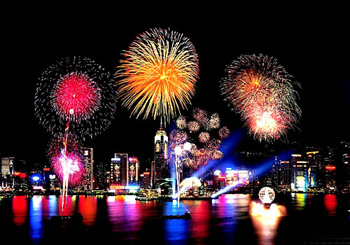| Tools: Save | Print | E-mail | Most Read |
| Many Cities Rolled into One |
| Adjust font size: |
Like any other big city in the world, Hong Kong, nicknamed "the
For some, big cities hold no attraction at all, but for many those could just be the right factors to contribute to an ultra unforgettable experience. Actually the best thing about being in There you will encounter grannies indulging in Cantonese operas and mahjong games, daring and energetic young Chinese men in slick suits speaking perfect English, and also, not too surprising perhaps, Westerners humming some dumb Cantopop tune while slurping their noodles. While there is a lot to do in the 1,102-square-kilometer city packed with some 6.8 million people, dining and shopping should be among those top priorities on any traveler's itinerary. Where to eat It is no exaggeration that once you are in Renowned for its exotic fusion of Eastern and Western flavors, The famous Chinese cuisine, noted for its various flavors, aromas and textures, is sure to satisfy even the most discerning of palates. The most popular styles of Chinese cooking in Besides, no trip to While many tea houses and restaurants offer an equally good dim sum collection, some do have their own secret recipes. For instance, the XO dipping sauce offered at Yat Tung Heen of Eaton Hotel, a medium spicy chef's recipe, could go perfect with almost all dim sum and make your culinary experience a more fulfilled one. Meanwhile, you may also want to have a try of bor law yau, a steaming hot sweet bun stuffed with melted butter, or daan tart, a tasty baked egg custard. These two popular snacks, while served with yuen yeung, a 50-50 mixture of tea and coffee, could be a well affordable and highly popular choice to soothe hunger pangs before supper. Moreover, any imaginable cuisine from all the other Asian countries can all be easily found in Where to shop Shop till you drop! Believe it or not, it can happen in Shopaholics could just expect a full retail therapy in this shopping paradise. With brand names from every corner of the world, as well as the tax free policy for all goods except alcohol and tobacco, From high-end shopping centers such as The Landmark, The Galleria and IFC mall to mid-end department stores including Sogo and Marks & Spencer, and then to bustling markets such as the For trendsetters, For those who want to hone their bargaining skills, the And for those who want an insight into something near and dear to the hearts of Chinese people, a visit to the Jade Market might be worth while. The green stone, smooth and cooling to the touch, is associated with long life and good health. Many Chinese people wear the jade - usually next to the skin - to ward off all sorts of health hazards. Located on Kansu and (Xinhua News Agency June 25, 2007)
|
| Tools: Save | Print | E-mail | Most Read |
 |
| Related Stories |
|
|
Product Directory China Search |
Country Search Hot Buys |
